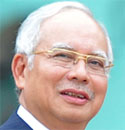Terrorism in Malaysia: Lurch to illiberalism

Datuk Seri Najib Razak,PM of Malaysia
By The Economist
Apr 11th 2015
Three years ago Najib Razak, Malaysia’s prime minister, fulfilled a promise to repeal the Internal Security Act (ISA), a draconian colonial-era law which had long been used to lock up dissenters without trial. In the early hours of April 7th legislators approved a new bill which reinstates some of the old law’s power. The Prevention of Terror Act gives a government panel the right to imprison terror suspects for two years, with multiple extensions, or restrict their movements for five years. Critics spy another blow to civil liberties, which were already under siege.
The government argued that the new law was needed to combat a mounting threat from domestic extremists inspired by Islamic State, the militia that occupies large parts of Syria and Iraq. Officials reckon that at least a dozen Malaysians have died abroad fighting for the militants. Police say that since 2013 they have arrested around 90 people suspected of sympathising with them. On April 5th, just hours before Parliament began debating the law, police nabbed 17 people who they said were planning attacks on Kuala Lumpur, the capital, and on Putrajaya, the government seat.
The timing looked suspicious to opponents of the act, which include Pakatan Rakyat, the opposition coalition. Many fewer Malaysians than, for example, Belgians are thought to have travelled to Syria. Nor is Malaysia, a moderately Muslim country, battling provincial Islamic insurgencies of the sort that trouble its neighbours, Thailand and the Philippines. The government has produced no evidence that such sweeping powers are warranted, the International Commission of Jurists, a human-rights group, claims. It laments that only one member of the government’s detention panel need have legal experience. Even without the panel’s consent, police may now hold suspects for up to 60 days.
The big worry is that the law will become a new weapon in a worsening crackdown on opponents of UMNO, Mr Najib’s party, which has ruled Malaysia in coalition since the 1950s but which was nearly unseated in elections held in 2013. In the first three months of this year police arrested 36 people on suspicion of making comments that violated the Sedition Act, another archaic law which is being invoked more frequently than ever. Last month Nurul Izzah, a prominent MP, was arrested on suspicion of sedition after she delivered a speech in Parliament denouncing the imprisonment of her father, Anwar Ibrahim, who leads the opposition. Many think the sodomy charge against him is politically motivated. Other recent detainees include five staff at the Malaysian Insider, a news website, and a cartoonist called Zunar, who faces nine counts of sedition and a prison sentence of up to 43 years.
Mr Najib had promised to roll back the Sedition Act, just as he promised to junk the ISA. Yet while pushing through the new anti-terror rules, his government took the opportunity to table changes to the act which would greatly toughen sentences and forbid speech that denigrates religion.
Both pieces of legislation highlight how far Malaysia has retreated from the reformist policies that Mr Najib espoused during his first term, which ended in 2013. Supporters plead that the prime minister is tacking right only to head off leadership challenges from even less palatable parts of his party (on April 2nd Mahathir Mohamad, an influential former prime minister, renewed his call for Mr Najib to step down). But that is not much comfort to anyone.
Source: http://www.economist.com/news/asia/21648027-anti-terror-law-curtails-liberties-lurch-illiberalism

No comments:
Post a Comment